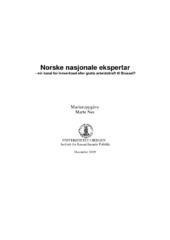Norske nasjonale ekspertar - ein kanal for innverknad eller gratis arbeidskraft til Brussel?
Master thesis
Permanent lenke
https://hdl.handle.net/1956/3758Utgivelsesdato
2009-12-04Metadata
Vis full innførselSamlinger
Sammendrag
The three European Free Trade Area (EFTA) countries Norway, Island and Liechtenstein are connected to the European Union (EU) through the European Economic Area (EEA) agreement. This agreement implies that a significant part of the EU legislation is to be continuously adopted by the before mentioned EEA countries. Yet, these countries have no impact on the process of forming new laws and proposals in the EU. Consequently, channels that might influence this process are of great importance to the EEA countries. The use of seconded national experts can represent such a channel. The research question in this thesis is thus: Does the Norwegian government use seconded national experts in the European Commission as a channel for influence, information and to acquire competence, and do the national experts behave as national representatives? Research on national experts has shown that they can be used as strategic instruments on behalf of national governments. Yet, studies have also indicated that the behavior of national experts is influenced by organizational and institutional factors, and the experts therefore do not act as national representatives. This thesis thus presents two hypotheses. The first hypothesis postulate that because the national experts are the only group of Norwegian national civil servants working for the Commission the government will seek to exploit the secondment system to increase their influence on the policy process. The second hypotheses expect the experts' perception of their role as independent agents for the Commission is the main obstacle for the government's effective use of the experts. This is a qualitative case study. It benefits from an original body of interview data, derived from national officials and national experts. It also includes several government documents and evaluations. The analysis finds that in spite of the fact that the experts emphasize their role as a national representative, the Norwegian government does not use the experts as strategic instruments in order to promote national interests. Thus, it is not the role perception of the national experts that represents the main obstacle for an effective use of the secondment, but a lack of coordination, and an attitude of reserve towards the use of informal channels by the national government. Noreg, Island og Liechtenstein er i dag knytt til Den europeiske union (EU), gjennom Det europeiske økonomiske samarbeidsområde (EØS). EØS-avtalen medfører at desse tre landa i dag er underlagt store delar av EU-lovgivinga, men har liten eller ingen formell moglegheit til å delta i utviklinga av nye lover og forslag. Derfor er andre kanalar for deltaking som kan gi innverknad spesielt viktige for eit land som Noreg. Ordninga med nasjonale ekspertar er det einaste norske inntaket til utformingsprosessen av nye forslag i EU. Problemstillinga i denne oppgåva er derfor: Nyttar norske myndigheiter ordninga med nasjonale ekspertar i Europakommisjonen (Kommisjonen) som ein kanal for innverknad, informasjonsutveksling og kompetanseheving, og opptrer ekspertane som nasjonale representantar? Tidlegare undersøkingar av korleis ordninga fungerer i medlemsland syner at nasjonale ekspertar kan vere effektive verktøy for nasjonale myndigheiter. På ei anna side finns det undersøkingar som peikar på at nasjonale ekspertar vert påverka av institusjonelle og organisatoriske faktorar gjennom sitt arbeid i Kommisjonen, og dermed ikkje vil opptre som nasjonale representantar. Oppgåva generer derfor to hypotesar. Den første hypotesen forventar at fordi nasjonale ekspertar er dei einaste norske byråkratane som arbeider i Kommisjonen, vil norske myndigheiter freiste å nytte ordninga som ein kanal for innverknad innanfor dei rammene som eksisterar for ordninga. I den andre hypotesen er forventinga at dei nasjonale ekspertane si rolleoppfatning er eit hinder for ein effektiv og strategisk bruk av ordninga. Analysen tek utgangspunkt i ei kvalitativ intervjuundersøking, der eg har gjennomført intervju med representantar frå myndigheitene og eit utval norske nasjonale ekspertar i Kommisjonen. I tillegg til dette vert det nytta ei rekke offentlege dokument og undersøkingar. Resultata frå analysen syner at på trass av at dei nasjonale ekspertane vektlegg si rolle som nasjonal representant, nyttar myndigheitene ekspertane i liten grad som eit strategiske verktøy. Dermed er det ikkje dei nasjonale ekspertane si rolleoppfatning som er eit hinder for ein effektiv bruk av ordninga, men snarare myndigheitene si manglande samordning og defensive haldning til bruk av uformelle kanalar som hindrar ein optimal bruk av ordninga.
Utgiver
The University of BergenOpphavsrett
The authorCopyright the author. All rights reserved
